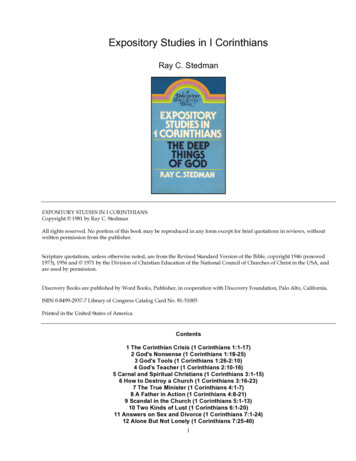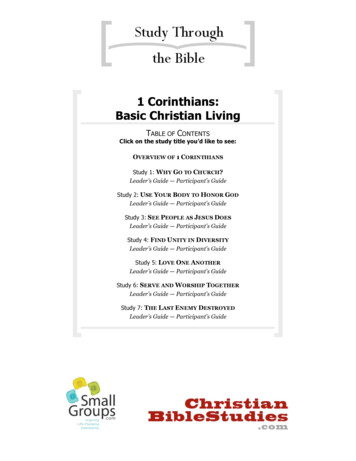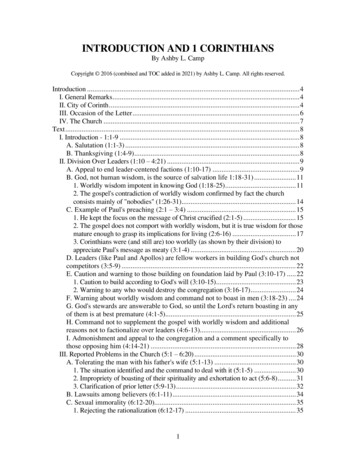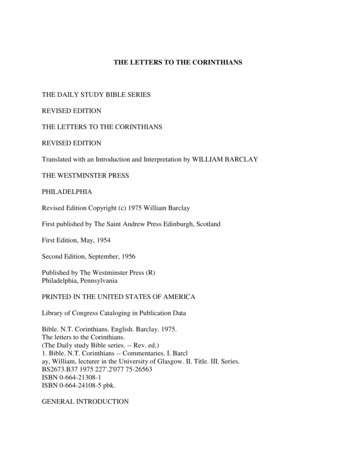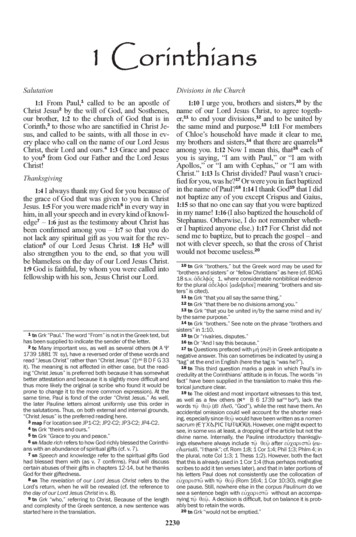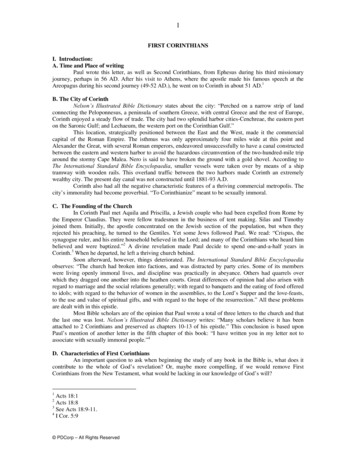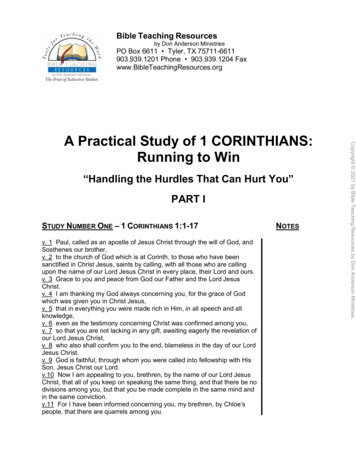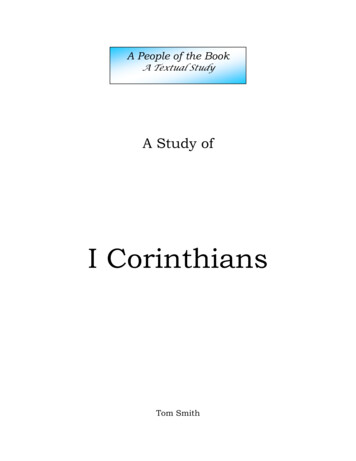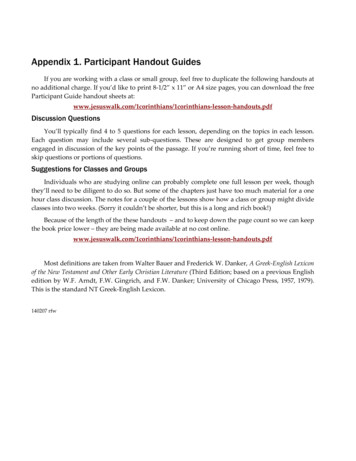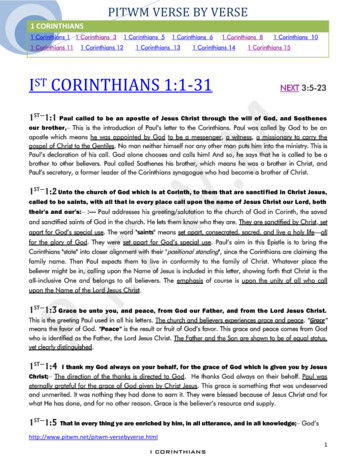
Transcription
PITWM VERSE BY VERSE1 CORINTHIANS1 Corinthians 1 1 Corinthians 31 Corinthians 111 Corinthians 121 Corinthians 51 Corinthians 61 Corinthians 131 Corinthians 81 Corinthians 14IST CORINTHIANS 1:1-311 Corinthians 101 Corinthians 15NEXT 3:5-231ST—1:1Paul called to be an apostle of Jesus Christ through the will of God, and Sosthenesour brother, This is the introduction of Paul’s letter to the Corinthians. Paul was called by God to be anapostle which means he was appointed by God to be a messenger, a witness, a missionary to carry thegospel of Christ to the Gentiles. No man neither himself nor any other man puts him into the ministry. This isPaul’s declaration of his call. God alone chooses and calls him! And so, he says that he is called to be abrother to other believers. Paul called Sosthenes his brother, which means he was a brother in Christ, andPaul’s secretary, a former leader of the Corinthians synagogue who had become a brother of Christ.1ST—1:2 Unto the church of God which is at Corinth, to them that are sanctified in Christ Jesus,called to be saints, with all that in every place call upon the name of Jesus Christ our Lord, boththeir's and our's: :— Paul addresses his greeting/salutation to the church of God in Corinth, the savedand sanctified saints of God in the church. He lets them know who they are. They are sanctified by Christ, setapart for God’s special use. The word "saints" means set apart, consecrated, sacred, and live a holy life—allfor the glory of God. They were set apart for God’s special use. Paul’s aim in this Epistle is to bring theCorinthians "state" into closer alignment with their "positional standing", since the Corinthians are claiming thefamily name. Then Paul expects them to live in conformity to the family of Christ. Whatever place thebeliever might be in, calling upon the Name of Jesus is included in this letter, showing forth that Christ is theall-inclusive One and belongs to all believers. The emphasis of course is upon the unity of all who callupon the Name of the Lord Jesus Christ.1ST—1:3 Grace be untoyou, and peace, from God our Father, and from the Lord Jesus Christ.This is the greeting Paul used in all his letters. The church and believers experiences grace and peace. "Grace"means the favor of God. "Peace" is the result or fruit of God’s favor. This grace and peace comes from Godwho is identified as the Father, the Lord Jesus Christ. The Father and the Son are shown to be of equal status,yet clearly distinguished.1ST—1:4I thank my God always on your behalf, for the grace of God which is given you by JesusChrist; The direction of the thanks is directed to God. He thanks God always on their behalf. Paul waseternally grateful for the grace of God given by Christ Jesus. This grace is something that was undeservedand unmerited. It was nothing they had done to earn it. They were blessed because of Jesus Christ and forwhat He has done, and for no other reason. Grace is the believer’s resource and supply.1ST—1:5That in every thing ye are enriched by him, in all utterance, and in all knowledge; l1I CORINTHIANS
PITWM VERSE BY VERSEgrace enriched the Corinthian believers in everything where they experienced the favor of God in everyarea of life. They were blessed with the gifts of utterance and of knowledge. The church and its believerswere enabled by God’s grace to know and understand the truth of God’s Word and to speak the truth to alost and dying world.1ST—1:6Even as the testimony of Christ was confirmed in you: This is a reference to the moment ofsalvation when the gospel was heard and believed and settled in their hearts. At that moment the enablingof verse 4 took place because one became a recipient of the grace of God. The gifts and grace of Godconfirmed the testimony of Christ in the hearts of believers.1ST—1:7 So that ye come behind in no gift; waiting for the coming of our Lord Jesus Christ:Paulmoves from specific provisions of speech and knowledge (v.5), to God’s general provision of all gifts that abeliever needs to serve Him. As having the evidence of the message of Christ confirmed within them, they will lackno spiritual gift. The Corinthian church members had all the spiritual gifts they needed to live the Christian life andto witness for Christ. God had already provided and continues to provide them with everything as they eagerlywait with anticipation for Christ’s coming.1ST—1:8 Who shall also confirm you unto the end, that ye may be blameless in the day of our LordJesus Christ. Since the Gospel had been faithfully preached and responded to by the Corinthian believers,they are now privileged to wait upon the Second Coming of Jesus Christ who in turn shall also confirm orestablish them as blameless before His heavenly Father in that day. He will confirm In that day when weenter heaven, we will not have all our sins and shortcomings flashed before us for everyone to see. Whenthe day of the Lord Jesus Christ comes, "He is going to present to Himself the church in all her glory,having no spot or wrinkle or any such thing: but that she should be holy and blameless" Eph.5:27.1ST—1:9 God is faithful, by whom ye were called unto the fellowship of his Son Jesus Christ ourLord. The believer’s resource and supply is God Himself. This strengthens the thought with assurance ofGod’s faithfulness. When God calls someone unto salvation, He is faithful to that call. If He called us whenwe were lost and wretched, He surely will not cease to be faithful to that call now that we have come intofellowship with His Son, Jesus. His glorious call has one specific purpose: to be in fellowship with His SonJesus Our Lord! The longing of God’s heart is for men to know his Son. And this is not on a temporarybasis; it means eternal fellowship. That word "fellowship" means partnership and oneness, and includesboth union and communion.1ST—1:10 Now I beseech you brethren, by the name of our Lord Jesus Christ, that ye all speak thesame thing, and that there be no divisions among you; but that ye be perfectly joined together inthe same mind and in the same judgment. The first major concern of the Apostle Paul as he addressedthis letter to the Corinthians had to do with their divisive spirit. There is a difference between having opposingviewpoints and being divisive. The word "division" means to split, to rend, to tear apart, schism. Thisdivision was not outside but inside the church. A divisive church is seen fuming and fighting. Paul approaches theproblem by first denouncing their factional spirit. He introduces his appeal for unity. He uses a significantway in which he addresses them. He "beseeches" them meaning "I call you to my side, let’s sharetogether", talk the matter over; beg, plead, and then address them as "brethren." He does not have fire inhttp://www.pitwm.net/pitwm-versebyverse.html2I CORINTHIANS
PITWM VERSE BY VERSEhis eyes or a spirit of rebuke and fight in his heart. He comes by the name of the Lord Jesus Christ. He putsChrist in front, whom they reverence. The sole purpose is that they all speak the same thing and that therebe no divisions among them. They are to be in perfect union together— unity in speech and fellowship,having the same mind and judgment. To be joined together in the same mind would involve thoughts,emotions, and reasonings fed by the Holy Spirit. To be joined together in the same judgment would involveconclusions, goals, and objectives.1ST—1:11 For it hath been declared unto me of you, my brethren, by them which are of the houseof Chloe, that there are contentious among you. The contention was so severe that some believer of thehousehold of Chloe went to Paul about the matter. Paul is writing to Corinth from Ephesus. The word"contentions" mean strifes, quarrels, and factions. They were arguing and splitting into groups,contending and quarreling over something. There were even cliques in the church and it got back to Paul.Contention is one of the terrible "works of the flesh."1ST—1:12 Now this I say, that every one of you saith, I am of Paul; and I of Apollos; and I of Cephas;and I of Christ. There appear to have been four rival parties.1. Those who professed to follow Paul—gifted in church order and uplifting believers.2. Those who professed to follow Appolos—gifted orator from Alexandria.3. Those who professed to follow Cephas; Peter—one with Christ in His earthly ministry.4. Those who professed to follow Christ—and not a man.The three great teachers of early years, around whom people gathered to hear and receive the message ofthe Gospel were preachers united in their message, however, their personalities attracted different people.There was the problem in preaching ability and style, turning liberty into license. And some denied needingor receiving the help of any man. Now the church was in danger of dividing. The message should be moreimportant than the messenger.1ST—1:13Is Christ divided: was Paul crucified for you” or were ye baptized in the name of Paul?Three things were asked of the Corinthians:1. Is Christ divided? In other words, "Is part of Christ over here with this group or clique or is Christpart of the other group? Which one rules; who is Lord; Is Christ within the church or is He in pieces?"2. Was Paul crucified for you? Paul was not the one crucified for the Corinthians! He was not the Saviorfor the Corinthians nor of any other body of believers! He did not hang on the cross to suffer in our place.3. Were you baptized in the name of Paul? A believer is only to be baptized in the name of the Lord JesusChrist, whose Name has all authority. Jesus did not baptize anyone personally (Jh.4:2), but His disciplesdid in the Name of Jesus.Their allegiance should have been to Christ and their support to the servants of Christ. The believerconfesses the Lord Jesus Christ and gives testimony that he is committing his life to follow the Lord.1ST—1:14I thank God that I baptized none of you, but Crispus and Gaius; Paul adamantly deniesthat he ever attempted to secure a personal following of believers when he said thank God I didn’t baptizedany of you except (Crispus and Gaius). Crispus was the leading ruler of the Jewish synagogue at Corinth.He was led to Christ and baptized by Paul personally (Acts 18:8). Gaius was Paul’s host when he was inCorinth (Rom. 16:23).1ST—1:15 Lest any should say that I had baptized in mine own name. For no believer can html3I CORINTHIANS
PITWM VERSE BY VERSEaccuse him of seeking to form a following or clique and baptizing them in his (Paul’s) name. He’s nottrying to cause any division.1ST—1:16 And I baptized also the household of Stephanas: besides, I know not whether I baptized anyother. Paul now recalls another he has baptized, Stephanas. He is one of the three messengers whodelivered the Corinthian letter to Paul. Paul baptized all members of his household (1Cor.16:5).1ST—1:17 For Christ sent me not to baptize, but to preach the gospel: not with wisdom of words,lest the cross of Christ should be made of none effect. Paul had a pacific assignment. It was not tobaptize, but to preach the Gospel, adding, not with wisdom of words; not with eloquent speech; words.The message was to be about the cross lest the big words spoken overshadow Christ and make Him ofnone effect, empty or deprived of substance. The success of the Gospel relies in the plain doctrine of acrucified Lord. It was not about being a great orator with Greek philosophy. The truth needed no artificialdress-up. It alone carries with it the "power of God unto salvation" (Rom.1:16). The Corinthians can behealed if they see the distinction of evangelizing the true mission of Christ on the cross, using God’swisdom more so than with speech that cannot be understood or received.1 ST—1:18 For the preaching of the cross is to them that perish foolishness; but unto us whichare saved it is the power of God. No other message has changed lives like the message of the cross ofChrist. The preaching of the cross is the power of God to those who are saved. However, that preachingof the cross is foolishness to those who are perishing. The seed of truth fell on hard ground. They are lostand do not like the message that man is saved through a crucified Messiah. It’s too simple for them! 1Theywanted God to act in ways that seem wise and powerful to them as a king would take territory, but Godsaves those who are willing to trust Him.1 ST—1:19 For it is written, I will destroy the wisdom of the wise, and will bring to nothing the understanding of the prudent. Since the perishing man trusts more in the wisdom of the wise, God says it iswritten in Isaiah 29:14c ″ for the wisdom of their wise men shall perish, and the understanding of theirprudent men shall be hid.″ How does Jesus destroy and make foolish the wisdom of the wise? It is by the cross.1. The cross exposes man’s reasoning and wisdom of his achievements, for it exposes the problemof their sin, their depraved and selfish heart. Whatever the achievement you hold, it cannot hold tothe weight of the cross. Jesus says, If I be lifted up, I will draw all men unto Me!2. The cross exposes man’s search for love, joy, peace, and all the other spiritual qualities of life. It canonly be found where they are least looking for it. ″For it is God who so loved the world that He gave ””He sent His word and delivered them .″3. The cross shows that the answer to man’s problems is the way of the sacrifice.It’s not in power and fame; selfishness and greed, nor human works and efforts, nor is it is in all the booksyou’ve read. Jesus destroys and makes foolish the wisdom of the wise by His sacrifice on an old rugged cross. It’sthat simple in that He laid down His life for us on the cross. That’s what sacrifice is: He laid down! What are welaying down? What are we putting down for God to do what He wants? Therefore, the glorious message of thecross is that God loves us enough to save us, by offering the perfect sacrifice for us. Jesus Christ, God’sown perfect Son took our sins upon Himself, died, was buried, and was resurrected by the Father to bringnew life; salvation to us. In this, Christ destroys the wisdom of the wise. It’s not man’s way. God wants us tosee what sacrifice looks like, and how to do it! You know the saying ”Let Go and Let wm-versebyverse.html4I CORINTHIANS
PITWM VERSE BY VERSE1 ST—1:20 Where is the wise? where is the scribe? where is the disputer of this world? hath notGod made foolish the wisdom of this world?— So, Paul asks the question: Where are the wise? Whereare the clever teachers, and where are the ones who know how to argue shrewdly of this world? Can’t yousee God don’t need all of that to get His message over. He only needs those who believe. So, hasn’t Godmade foolish the wisdom of this world? In all of the world’s wisdom, they still don’t understand or can figureout the way or worth of the cross. They still can’t figure out spiritual truth without Christ or the Spirit of God.Man can do nothing without God. What they deem valuable in this world is made foolish when they do notunderstand the cross.1 ST—1:21 For after that in the wisdom of God the world by wisdom knew not God, it pleasedGod by the foolishness of preaching to save them that believe. It all still comes down to even withthe wisdom that the wise have, they still didn’t know God. ″It (literally) pleased God by the foolishness ofpreaching to save them that believe.″1. The wise don’t know that the cross is the wisdom of God. His wisdom is the way He has chosen tosave the world. That’s why we are to learn the wisdom of God. Although it may seem foolish to theworld, it is the key wisdom to use for those who want to be saved. We get to share that love He’s given.2. The wise still don’t know that the cross is the power of God to save who believe. This power is in theutterance of the Word of God, that the world of the wise deems foolish. Their unbelief leads themaway from the cross. Jesus loved much and He gave much for us upon that cross!1 ST—1:22 For the Jews require a sign , and the Greeks seek after wisdom:— The world hasmade some mistakes in looking at the cross:The Jews or religionists of the world feel they are the chosen seed of God, but they were alwayslooking for a sign; for a miracle; a physical wonder, then they would listen.The Greeks want to listen to a message that has clever ideas; flowery speech about earthly affairs;intellectual splendor, which make them seem eternal.1 ST—1:23 But we preach Christ crucified, unto the Jews a stumblingblock, and unto theGreeks foolishness;— Preaching Christ crucified to the Jews was a stumblingblock, and with the Greeksit’s foolishness. Both found it equally difficult to accept Jesus on the cross as an eternal Savior.Generations makes the mistake of stumbling over the simplicity of the cross.1 ST—1:24 But unto them which are called, both Jews and Greeks, Christ the power of God, andthe wisdom of God.The called of God find Christ. This is where both Jews and Greeks discover that Christ is thepower of God, and He is the wisdom of God. They discover that Jesuso Christ brings to their hearts and lives deliverance from the sin and restlessness of their souls.o He brings the knowledge of God and the infilling love, and peace He gives.o He brings the guidance and direction of God as they walk through the trials of life day by day.o He brings perfect assurance that we will live eternally with God.o He brings the greatest purpose and meaning in life possible, and that is, of reaching andministering to a world that reels under the weight of calamity and desperate needs—nomatter the cost.1 ST—1:25 Because the foolishness of God is wiser than men; and the weakness of God isstronger than men. The cross (the foolishness of God) proves that God’s way is wiser, and (the weaknessof God) is stronger than man’s way because it saves men. When a man truly bows before the cross, hehttp://www.pitwm.net/pitwm-versebyverse.html5I CORINTHIANS
PITWM VERSE BY VERSEsurrenders all he is and all he has to Christ, and Christ makes him into a new creature.1 ST—1:26 For ye see your calling, brethren, how that not many wise men after the flesh, notmany mighty, not many noble, are called:— The Corinthians needed to remember who they were; tolook at themselves that:Not many wise men after the flesh (those who pursue and live for the fleshly wisdom of this world)were called. Few of these are ever saved.Not many were mighty; powerful, for their earthly position and power have no bearing upon God’sacceptance of them.And not many noble were called. Such may be esteemed by men, but they are not esteemed by God.Pride, self-sufficiency, self-righteousness, self-centeredness keeps men from becoming acceptable to God.Men are saved by the grace of God, not by self-effort, their wisdom, their might, or nobility. Therefore, theyhad no excuse for acting snobbish, or for criticizing or ignoring others.1 ST—1:27 But God hath chosen the foolish things of the world to confound the wise; and Godhath chosen the weak things of the world to confound the things which are mighty;— God has calledbrethren that were not wise, mighty, nor noble, but God has ″chosen″ the foolish things. This lets us knowthat God takes the imitative in saving men. He knows why He chooses the simple and humble over theoutstanding.God chooses the foolish things of this world. Why? to confound (shame) the wise. The wise with alltheir knowledge won’t honestly take the foolish things of this world as genuine enough to truly study orbelieve God in the Holy Scriptures as truth. That’s why no flesh will glory in God’s presence.God chooses the weak things of this world. Why? to confound (shame) the things which are mighty.The mighty that boast or have titles with their chest stuck out won’t take the weak things that Godwould choose. That’s why no flesh will glory in God’s presence.The wise think selfishly and think they are able to save themselves, while God is willing to use the foolishand weak things that will give total allegiance with humility to Him.1 ST—1:28 And base things of the world, and things which are despised, hath God chosen,yea, and things which are not, to bring to nought things that are:—God chooses the base things (lowly things) and the despised things of this world. Why? Because pride,arrogance, self-righteousness, and self-sufficiency can’t stand before God.God chooses the things which are of nothing; things not up to man’s standard, and use the thingsthat seem to be nothing, to nullify (dethrone) the things that are.1 ST—1:29 That no flesh should glory in his presence.All those who think they are something inthis world, God eliminates their boasting. Why? That no flesh should glory in His presence.1 ST—1:30 But of him are ye in Christ Jesus, who of God is made unto us wisdom, andrighteousness, and sanctification, and redemption:— ″But of Him″ means out of Him; out of Hisnature of love and salvation, God chooses ″you″ or ″us″ to be in Christ—our position is in Christ.1. God’s real wisdom is Jesus Christ, His only Son. God has given His wisdom to the world through HisSon Jesus Christ. And through Jesus Christ: God’s wisdom has spoken to the world. God’swisdom has revealed itself to the world. God’s wisdom has lived before the world in humanflesh. Therefore, man now knows the way, the truth, and the life of God. So, man is without excuse.2. Christ is the righteousness of God. Righteousness shows just how wise God really is. Man by hisvery nature can’t live in God’s presence, therefore, man’s answer is Jesus Christ. He is the only way ahttp://www.pitwm.net/pitwm-versebyverse.html6I CORINTHIANS
PITWM VERSE BY VERSEman can become righteous. Jesus Christ stood before God and before the world as the perfect,ideal, sinless, and righteous Man for the unrighteous man, and covered the righteousness of every man.3. Christ is the sanctification of God.(a) Sanctification means to be set apart unto God. Jesus Christ set His life apart to live for God,and He lived for God perfectly and righteously. When a man believes in Jesus Christ, God takesthat man’s faith and counts it as one of His, as set-apart unto Him.(b) Sanctification means holiness and righteous, pure, and clean life. God puts the Spirit of Christ—the very life and energy and power of Christ, who is the Holy Spirit into the heart and life of thenew believer to live. As he follows in the footsteps of Christ, living more and more like Christ did,he becomes more and more sanctified day by day.4. Christ is the redemption of God. When Jesus Christ died, His death became the ideal and RepresentativeMan for all men. He was able to bear the punishment for every man’s sins. And through his death,Jesus Christ redeems (delivers) us from sin, death, and punishment. He has redeemed us back toGod. He is the Redeemer, the Deliverer for this world to God.1 ST—1:31 That, according as it is written, He that glorieth, let him glory in the Lord. Accordingas it is written, the purpose of God sending Christ to earth was to stir men to praise God instead ofboasting in their own wisdom and self-sufficiency. ″If anyone is going to boast, let him boast only of whatthe Lord has done.″SUMMARY:1Paul was called by God to be an apostle which means he was appointed by God to be a messenger, awitness, a missionary to carry the gospel of Christ to the Gentiles. Paul called Sosthenes his brother, whichmeans he was a brother in Christ, and Paul’s secretary, a former leader of the Corinthians synagogue whohad become a brother of Christ. 2Paul addresses his greeting/salutation to the church of God in Corinth. He’saddressing the saved and sanctified saints of God in the church. He lets them know who they are. They aresanctified by Christ Jesus for God’s exceptional use. 3 Grace and peace, from God the Father, and from theLord Jesus Christ is the greeting Paul used in all his letters. 4The direction of his thanks is directed toward Godon behalf of the Corinthians. We are blessed because of God’s grace and for no other reason. 5God’s graceenriched the Corinthian believers in everything where they experienced the favor of God in every area of life.They were blessed with the gifts of utterance and of knowledge. 6The gifts and grace of God confirmed thetestimony of Christ in the hearts of believers. 7As having the evidence of the message of Christ confirmedwithin them, they will lack no spiritual gift. 8In the day of our Lord’s return He will confirm or establish thechurch as blameless before His heavenly Father. 9 When God calls someone unto salvation, He is faithful tothat call. If He called us when we were lost and wretched, He surely will not cease to be faithful to that callnow that we have come into fellowship with His Son, Jesus. His glorious call has one specific purpose: tobe in fellowship with His Son Jesus Our Lord! (1:1-9).10The first major concern of the Apostle Paul as he addressed this letter to the Corinthians had to do withtheir divisive spirit. There is a difference between having opposing viewpoints and being divisive. There is adifference between having opposing viewpoints and being divisive. He introduces his appeal for unity—Tobe joined together in the same mind would involve thoughts, emotions, and reasonings fed by the HolySpirit—To be joined together in the same judgment would involve conclusions, goals, and objectives.11The contention was so severe that they were arguing and splitting into groups, contending, and quarrelingover something, having cliques in the church, and it got back to Paul. 12There appear to have been four rivalparties. (1.) Those who professed to follow Paul. (2.) Those who professed to follow Apollos. (3.) Those whohttp://www.pitwm.net/pitwm-versebyverse.html7I CORINTHIANS
PITWM VERSE BY VERSEprofessed to follow Cephas. (4.) Those who professed to follow Christ. 13Three things were asked of theCorinthians: (1.) Is Christ divided? (2.) Was Paul crucified for you? (3.) Were you baptized in the name ofPaul? A believer is only to be baptized in the name of the Lord Jesus Christ, whose Name has all authority.Jesus did not baptize anyone personally (Jh.4:2), but His disciples did in the Name of Jesus. 14 Paul says, ″Ithank God that I baptized none of you″, but he was led to baptize Crispus and Gaius. Crispus was theleading ruler of the Jewish synagogue at Corinth and Gaius was Paul’s host when he was in Corinth. 15Forno believer can rightfully accuse him of seeking to form a following or clique and baptizing them in his (Paul’s)name. He’s not trying to cause any division. 16Paul now recalls another he has baptized, Stephanas. He isone of the three messengers who delivered the Corinthian letter to Paul. 17Paul had a pacific assignment. Itwas not to baptize, but to preach the Gospel, adding, not with wisdom of words; not with eloquent speech;words. The message was to be about the cross lest the big words spoken overshadow Christ and makeHim of none effect, empty or deprived of substance. (1:10-17).18No other message has changed lives like the message of the cross of Christ. The preaching of the cross isthe power of God to those who are saved, but foolish to those who perish. 19Since the perishing mantrusts more in the wisdom of the wise, God says it is written in Isaiah 29:14c ″ for the wisdom of their wisemen shall perish, and the understanding of their prudent men shall be hid.″ 20So, Paul asks the question:Where are the wise? Where are the clever teachers, and where are the ones who know how to argueshrewdly of this world? Can’t you see God don’t need all of that to get His message over. He only needs thosewho believe. So, hasn’t God made foolish the wisdom of this world? 21In all the wisdom that the wisehave, they still didn’t know God. ″It (literally) pleased God by the foolishness of preaching to save them thatbelieve.″ 22The world has made some mistakes in looking at the cross: the Jews required a sign, and theGreeks sought after wisdom. 23Generations makes the mistake of stumbling over the simplicity of thecross. Preaching Christ crucified to the Jews was a stumblingblock, and with the Greeks it’s foolishness. Bothfound it equally difficult to accept Jesus on the cross as an eternal Savior. 24The called of God find Christ. Thisis where both Jews and Greeks discover that Christ is the power of God, and He is the wisdom of God,25because the cross (the foolishness of God) proves that God’s way is wiser, and (the weakness of God) isstronger than man’s way because it saves men (1:18-25).26 The Corinthians needed to remember who they were; to look at themselves in God’s calling, how that notmany wise men after the flesh (fleshly wisdom), not many mighty (powerful in position), not many noble(esteemed), are called, 27but God chose the foolish things of the world to confound (confuse) the wise;and God chose the weak things of the world to confound the things which are mighty; 28and God choosethe base things (lowly things) and the despised things of this world, and use the things which are of nothing;the things not up to man’s standard, bringing to nothing, the things that are. 29All those who think they are somethingin this world, God eliminates their boasting. Why? That no flesh should glory in His presence. 30But out ofHim; out of His nature of love and salvation, God chooses ″us″ to be in Christ—our position is in Christ. Hemade us acceptable to God to have wisdom, and righteousness, and sanctification, and redemption. Everythingwe need is in Christ, his only begotten Son! 31According as it is written, the purpose of God sending Christto earth was to stir men to praise God instead of boasting in their own wisdom and self-sufficiency. "If anyone isgoing to boast, let him boast only of what the Lord has done" (1:26-31).APPLICATION:I m
1 I CORINTHIANS 1 CORINTHIANS IST CORINTHIANS 1:1-17 NEXT 5:1-12 1ST—1:1 Paul called to be an apostle of Jesus Christ through the will of God, and Sosthenes our brother, This is the introduction of Paul’s letter to the
